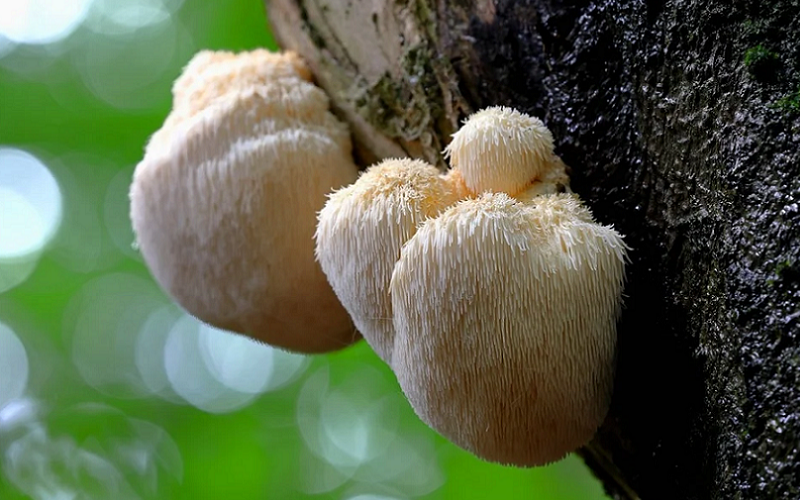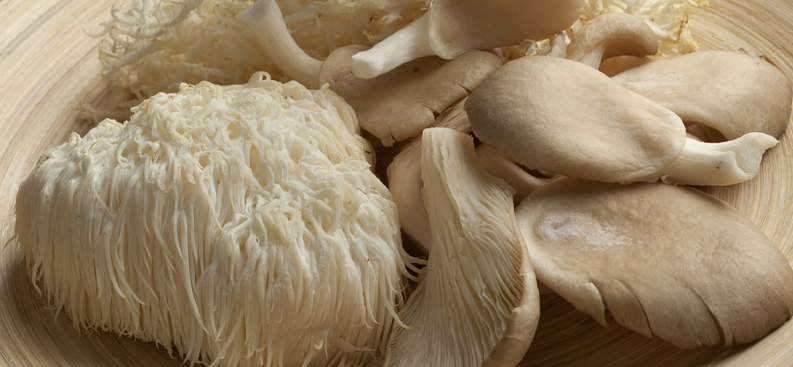
In recent years, the quest for natural remedies to address mood disorders and enhance mental health has led many to the fascinating world of nootropics. Among these, the Lion’s Mane Mushroom stands out as a beacon of hope. This remarkable fungus, scientifically known as Hericium erinaceus, has been gaining acclaim not only for its unique appearance but also for its potent mood-enhancing and cognitive benefits. Historically revered in Eastern medicine and now embraced in Western wellness circles, Lion’s Mane Mushroom offers a natural, holistic approach to improving mental health.
Contents
Introduction to Mood Disorders and Lion’s Mane Mushroom
The pursuit of mental wellness and cognitive enhancement has led many to explore the realm of natural nootropics. Among these, Lion’s Mane Mushroom, or Hericium erinaceus, has emerged as a natural wonder, garnering attention for its remarkable benefits in mood elevation and mental health.
Overview of Mood Disorders and Mental Health Challenges
In today’s fast-paced world, mental health issues like depression and anxiety are increasingly common. These challenges often lead to a reduced quality of life and can have significant impacts on our daily functioning. Traditional treatments, while effective, come with their own set of limitations and side effects, prompting many to seek natural alternatives.
Introduction to Lion’s Mane Mushroom as a Natural Solution
Lion’s Mane Mushroom has been used for centuries in traditional Eastern medicine, but only recently has it caught the eye of the Western world for its mental health benefits. Known for its unique, shaggy appearance resembling a lion’s mane, this mushroom is more than just a culinary delicacy. It contains bioactive substances believed to promote brain health, enhance mood, and improve cognitive functions.

The Science Behind Lion’s Mane Mushroom
Lion’s Mane Mushroom isn’t just a natural wonder by appearance; its real magic lies in its biochemical makeup and its effects on the brain. Understanding the science behind this mushroom is crucial to appreciating its potential as a mood enhancer and a cognitive aid.
Key Compounds in Lion’s Mane Mushroom and Their Effects on the Brain
Lion’s Mane is rich in bioactive substances, including hericenones and erinacines. These compounds are known to stimulate the production of Nerve Growth Factor (NGF) in the brain. NGF is a protein that plays a critical role in the growth, maintenance, and survival of neurons, the cells responsible for transmitting information throughout the brain and body. By promoting NGF, Lion’s Mane may help improve neural health, which is crucial for cognitive functioning and mental health [1].
How Lion’s Mane Impacts Neurotransmitters Related to Mood
Neurotransmitters are chemicals in the brain that transmit signals between neurons. They play a significant role in regulating mood, emotions, and cognitive functions. Research suggests that Lion’s Mane can influence the production of several neurotransmitters, including serotonin and dopamine.
These ‘feel-good’ neurotransmitters are vital in regulating mood, happiness, and anxiety. An imbalance in these neurotransmitters often leads to mood disorders, and Lion’s Mane’s ability to influence their levels offers a natural way to maintain mental balance.
Overview of Neurogenesis and Nerve Growth Factor (NGF)
Neurogenesis, the process of creating new neurons, is essential for a healthy, functioning brain. As we age, the rate of neurogenesis tends to decrease, which can lead to cognitive decline and various mental health issues. Lion’s Mane’s ability to stimulate NGF production not only supports the maintenance of existing neurons but also potentially promotes neurogenesis. This effect may provide significant benefits for brain health, potentially aiding in the prevention of cognitive decline and supporting overall mental wellness.
Lion’s Mane and Its Mood-Enhancing Properties
Beyond its cognitive benefits, Lion’s Mane Mushroom is particularly lauded for its mood-enhancing properties. The correlation between its bioactive components and improved mental health is not just anecdotal; it’s grounded in scientific research.
Evidence of Lion’s Mane Mushroom’s Antidepressant-Like Effects
Multiple studies have shown that Lion’s Mane can have antidepressant-like effects. These studies, conducted in both animal models and human trials, indicate that the mushroom may help alleviate symptoms of depression. This is believed to be due to its impact on brain chemistry, particularly its ability to modulate neurotransmitters that affect mood and emotional well-being [2].
Lion’s Mane Reduces Anxiety and Stress Levels
Anxiety and stress are pervasive challenges in modern society, often contributing to a range of mental health issues. Lion’s Mane has been observed to help reduce feelings of anxiety and stress. This is thought to be linked to its anti-inflammatory properties and its effect on promoting neurogenesis, leading to a more balanced and healthy brain environment.
Comparison of Lion’s Mane with Traditional Mood-Enhancing Supplements
When compared with traditional mood-enhancing supplements, Lion’s Mane stands out for its natural origin and lack of significant side effects. While many conventional treatments for mood disorders come with a host of potential side effects, Lion’s Mane offers a more gentle approach. Its natural compounds work in synergy with the body, promoting balance and well-being without the harsh impact often associated with pharmaceuticals.

Lion’s Mane and Cognitive Health
While Lion’s Mane Mushroom is celebrated for its mood-enhancing capabilities, its impact on cognitive health is equally significant. The mushroom’s unique compounds not only support mental well-being but also contribute to improved brain function and cognitive resilience.
Lion’s Mane Improves Cognitive Functions and Memory
Studies have shown that Lion’s Mane can positively affect cognitive functions, particularly memory and concentration. These benefits are attributed to the mushroom’s ability to stimulate the production of Nerve Growth Factor (NGF) and promote neurogenesis. As a result, regular consumption of Lion’s Mane may enhance memory, focus, and overall cognitive agility, which is especially beneficial as we age [3].
Potential Benefits of Lion’s Mane for Dementia and Alzheimer’s
Emerging research suggests that Lion’s Mane may offer potential benefits in the context of neurodegenerative diseases such as dementia and Alzheimer’s. Its neuroprotective properties and ability to stimulate nerve growth and repair could play a role in slowing down the progression of these diseases or alleviating some of their symptoms. While more research is needed in this area, the initial findings are promising.
Studies Highlighting Lion’s Mane Mushroom Cognitive Enhancements
Numerous studies have explored the cognitive-enhancing effects of Lion’s Mane. These studies, ranging from animal research to human clinical trials, have consistently reported improvements in various aspects of brain function. Subjects taking Lion’s Mane supplements have shown enhanced mental clarity, improved memory recall, and increased attention span, highlighting the mushroom’s potential as a cognitive enhancer [4].
Incorporating Lion’s Mane into Mental Health Regimens
Integrating Lion’s Mane Mushroom into daily health routines can be a game-changer for individuals seeking natural ways to enhance their mental health and cognitive abilities. Understanding the best ways to incorporate this potent natural nootropic is key to maximizing its benefits.
Recommended Forms and Dosages of Lion’s Mane Mushroom
Lion’s Mane is available in various forms, including fresh mushrooms, powders, capsules, and teas. The most effective form can vary based on personal preference and lifestyle. When it comes to dosage, it’s generally recommended to follow the manufacturer’s guidelines on supplements. For fresh mushrooms, incorporating them into meals is an enjoyable way to consume them, although the precise dosage can be more challenging to measure.
Dietary Sources and Supplement Options for Lion’s Mane Mushroom
Including Lion’s Mane in your diet isn’t just about supplements; the mushroom can be a delicious addition to meals. Its seafood-like flavor makes it a popular culinary choice. For those who prefer supplements, there is a wide range of products available, from capsules to tinctures, each offering a convenient way to consume Lion’s Mane [5].
Combining Lion’s Mane with Other Natural Mood Enhancers
For those looking to maximize the mood and cognitive benefits, Lion’s Mane can be combined with other natural mood enhancers like Omega-3 fatty acids, magnesium, or green tea. This synergistic approach can amplify the benefits, though it’s important to research and consult healthcare professionals before combining supplements, especially if you’re on medication or have underlying health conditions.
References
[1] Therapeutic Potential of Hericium erinaceus for Depressive Disorder
[2] Health Benefits of Lion’s Mane Mushroom
[3] Lion’s Mane
[4] All About Lion’s Mane Mushroom Benefits
[5] Can Lion’s Mane Be Used To Help Improve Mood?

